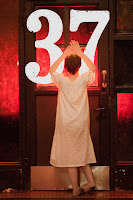the traveler's resource guide to festivals & films
a FestivalTravelNetwork.com site
part of Insider Media llc.
Film and the Arts
Broadway Review: August Wilson's "Jitney"
- Details
- Parent Category: Film and the Arts
- Category: Reviews
- Published on Monday, 30 January 2017 19:25
- Written by Kevin Filipski
 |
| The cast of Jitney (photo: Joan Marcus) |
January '17 Digital Week IV
- Details
- Parent Category: Film and the Arts
- Category: Reviews
- Published on Tuesday, 24 January 2017 14:24
- Written by Kevin Filipski
Bad Day at Black Rock
But it’s in 20th century music that these discs come to fiery life: Shostakovich and Prokofiev (too little of the latter, but still); Messaien and Bernstein; and, above all, Benjamin Britten, who composed the weighty Cello Symphony for Rostropovich and the latter returns the favor by giving marvelous performances of that, Britten’s Cello Sonata and two cello suites.
Lastly, there are two unusually fine discs of Rostropovich accompanying his wife, soprano Galina Vishnevskaya, in Russian songs from Glinka and Rachmaninov to Tchaikovsky and Prokofiev, closing a terrific-sounding and beautifully-packaged summary of one man’s life filled with music.
Staatskapelle Berlin Plays Classics of Mozart at Carnegie Hall
- Details
- Parent Category: Film and the Arts
- Category: Reviews
- Published on Monday, 23 January 2017 15:52
- Written by Jack Angstreich

Daniel Barenboim
One of the most imposing highlights of the current season at Carnegie Hall is a complete cycle of the nine symphonies of Anton Bruckner performed by the august Staatskapelle Berlin under the direction of the renowned pianist and conductor, Daniel Barenboim. Almost all of the symphonies are paired with a concert work by Wolfgang Amadeus Mozart, mostly piano concerti played by Barenboim, conducting from the piano. (Bruckner also completed two early symphonies before his No. 1, a study symphony and the Symphony No. 0; regrettably, neither will be presented in this cycle.)
The series opened auspiciously on the evening of Thursday, January 19th, with a sterling reading of the popular Piano Concerto No. 27, the composer's final work in the genre. The seldom heard, remarkable Symphony No. 1 made an even stronger impression—played here in the original , "Linz" version —and both halves of the concert were rewarded with avid applause.
The music of the following evening began even more arrestingly with a gripping account of the dramatic Piano Concerto No. 20, in one of the most satisfying renditions in recent memory. Also exhilarating was the rarely played Symphony No. 2—presented in the 1877 version edited by Leopold Nowak —surpassing the accomplishment of the previous night. An ardent ovation was a prelude to a noteworthy announcement — that this date marked the sixtieth anniversary of Barenboim's first appearance on the Carnegie Hall stage when he performed at age fourteen with the legendary Leopold Stokowski. The conductor, after recounting an amusing anecdote about the genesis of that event, movingly delivered some impassioned remarks about the necessity to preserve music and the arts in these troubled times— statements which were received with great warmth by the enthusiastic audience.
Barenboim and these musicians were impressively able to match the intensity of that night at the ensuing concert on the following evening, this time with a magnificent reading of the ambitious Piano Concerto No. 24. The program closed triumphantly with an engrossing account of the formidable, stirring, 1878 version of Symphony No. 3, with the passionate applause bringing an exciting weekend to a pleasing conclusion.
Theater Review—“The Beauty Queen of Leenane” at BAM
- Details
- Parent Category: Film and the Arts
- Category: Reviews
- Published on Friday, 20 January 2017 22:42
- Written by Kevin Filipski
 |
| Marie Mullen, Aisling O'Sullivan and Aaron Monaghan (photo: Stepehen Cummiskey) |
More Articles...
Newsletter Sign Up


















